"Let's get technical" - Stuart Barnes talks to Steve Hackett
and Roger King about the recording of Steve's new album. Interview conducted
at MAP Studios Twickenham on Tuesday 21st March 2006. Interview and photos by
Stuart Barnes.
NOTE: The phrase "in the box" is used a lot by Steve
and Roger in this interview. It was their way of referring to the computer they
use.
SB: Right, Alan has come up with an idea of a series of technical interviews
with band members and people related to Genesis and it is your turn today. So,
hopefully we will get the low down on how you write and record and what all
this equipment does. First of all, I am a little bit confused about the two
locations; you've got Crown Studios just over the road there and MAP here…
SH: Well, the office is over there and Kim's studio and so in some ways
that is more of a base over there for all things related to business and here
it is all things musical.
SB: So there is no recording facility over there?
SH: No, there is no recording facility over there, none.
SB: Right. It is quite a nice set up actually, not quite what I was
expecting to be honest, built out of what looks like a converted house?
SH: I am not quite sure what it was originally, I think it was a purpose-built
furniture making operation at one point and now instead of furniture we make
music here.
RK: Light-industrial anyway.
SH: I am not allowed to sleep here but I do sometimes pass out from
programmitis (laughs).
SB: It seems nicely soundproofed here with the triple glazed windows
and you have obviously beefed up the walls…
SH: Well, we do turn the amps up to eleven very often and we haven't
had any complaints from the neighbours. It is just about a free standing structure.
RK: It is properly acoustically designed it is not just slung together
in an old building. It was done by acoustic architects of great renown, Recording
Architecture, and put together according to their specifications so in theory
the room is reasonably flat and reasonably free from resonance. The recording
area downstairs is lively-ish but controllably lively.
SB: I saw that as I came in. You have the drums and everything, and
you can crank up the amps...
SH: Yeah, we basically function in this room; I very rarely stand down
there and do an overdub myself. It is all done up here and it deadens it; monitoring
up here so I have a better chance of being in time and in tune to start off
with before we correct it of course! (laughs).
RK: The recording room is specifically for drummers and guitar amps
really, there are no humans down there (laughs).
SB: How are things recorded at the moment, I have read on your website
that you recorded Darktown I think it was; on the ADAT setup. I assume you have
moved on from that?
SH: Yeah along time ago. Parts of Darktown were recorded on a Studer
… was it an A80?
RK: An 2-inch A80. Back in the mists of time then.
SH: Back in the mists of time and then we moved on to ADAT and now of
course, most things are done in the box but you would have to speak to Roger
about that.
SB: That’s hard disk isn't it?
RK: Yeah, the ADAT is still in pieces from the last time I powered them
up when they were two thirds functional.
SB: So they make good paperweights now then?
RK: Well, there is such a lot of stuff that Steve has recorded on ADAT
that just occasionally they are needed to get back up old material.
SB: Have you not thought about transferring it all to a PC?
RK: I have thought about it but it is an enormous job you walked past
the wall of tapes as you came in there, I don't know how many there are; several
hundred probably and quite apart from the time involved in doing a transfer,
I'd be fairly certain of that several hundred, about fifty would get eaten in
the process trying to transfer them anyway with it being the unreliable medium
that it is.
SH: It was always unstable. Working with ADAT made for a very nervous
time every time those tapes ran hoping that you had a back up and a back up
for the back up in case so many performances would get chewed.
RK: We did make back ups religiously it was every day and sometimes
more often than that if you had a performance that was worth preserving. At
least you made sure it was copied somewhere else. Fortunately that has long
since retired and it is now all hard disk stuff now.
SB: Is that Pro Tools?
RK: Well we are using Logic and we do have an old
Pro Tools set up here but it never made it past Digidesign's upgrade policy
and isn't used anymore. The last three albums have been done exclusively
in Logic using the native audio engine.
SB: The whole thing?
RK: Yeah. Well with external mic amps and the odd bit of external
reverb so it was 99% in the box.
SB: I hate to say it, but that is a rather old desk you have there.
Is that the Angela?
|
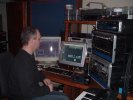 Roger working 'in the box'
Roger working 'in the box'
Photo: S Barnes/TWR |
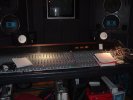 The Amek Angela coffee table
The Amek Angela coffee table
Photo: S Barnes/TWR |
RK: Yes it is. Well it is a music stand really as
you can see it is no longer used as a desk. We use the volume control
and the and the source selector and that's about it.
SH: We spill the tea on it quite a bit (laughs).
RK: The mic amps get used occasionally when we are recording drums
I tend to go through that but it is largely retired.
SB: I was actually going to say what do you do here but you seem
to have answered that question really… |
SH: I think what we do here is make test tube babies basically. We mix
this tremendous amount of real and sample, and that's giving away something
right then and there isn't it? Basically we have conversations and then we try
and put it into effect; we work out whether we are going to have real stuff
whether we are going to make the cartoon look ever more like real actors. It
is a very difficult process to talk about I think because in an ideal world
you have a fully functioning band or a fully functioning orchestra but very
often we are tracking up people; small forces to create orchestral sounds and
it is not as if I have a band on twenty four hour call and I often joke about
two people having a musical conversation and three having a musical argument
and so between ourselves there is all the steam and heat taken out of it. I
am not explaining this very well because anyone who walked in on the process
would realise that it happens at the speed of watching paint dry and would be
appalled at the amount of close detail we work in. But the days of; 'Right lads,
lets pack the gear in the bus and do a gig and record it' in the studio world
that isn't how it works you should file it under "Cliff Richard" films;
Summer Holiday (laughs). It is the two of us sitting down and taking out time
over what happens next and it is a very unhurried pace. We do whatever it takes
to get the sound; if its the performance or the man we use it and try and get
it out of the man or woman …if it moves we track it!
SB: So, does that mean that you will be sitting here with your guitar
and Roger will be at the keyboards and you will try and work things out that
way or is it just literally shouting things at Roger to get on the computer?
RK: It's about half way between the two. Steve writes the song and my
job is as a programmer and keyboard player and I guess, recording engineer too.
They are all Steve's songs but (and I am sure he won't mind me saying so) he
isn't terribly technically literate; certainly not a computer operator!
SH: Exactly.
RK: For me working in the box is fantastic because I have got ever more
control over audio and over arrangements whether it is recorded audio or MIDI.
But it does mean that for people who are not directly involved in moving the
mouse or pressing the key there isn't a fader where you can say 'can I make
this a bit louder? Lets just push this up a bit' and so it concentrates the
technical aspects of the work much more on one person and producers do, to a
large extent; have to sit at the back and bark commands, as you say. Their involvement
becomes more and more remote until it is almost an academic pursuit in some
ways putting these bits and pieces together …
SH: I'm a humble guitarist and I like to have conversations about what
happens next and I think that the danger is that, in the last … how many
years would it be? Twenty five years or more… thirty years perhaps guys
can make albums on their own but it is nice to sit down with a mate and say
'what do you think? I'm not sure about that. Maybe we could try such and such?'
which is a million miles away from the idea of the composer sitting down with
the score sheet and it was set in stone and you can't change it. This is a very
flexible way of working and I think it is wonderful. I do get frustrated that
I can't have a fader and just turn something up; it has to be agreed in increments
and sometimes the simplest things that were done in the old fashioned way of
working seem to be much more difficult to do now. But the amount of choices
you have now is fantastic. It's wonderful to be able to produce work that is
both in time and in tune.
SB: So, from what you are saying about not being able to grab a fader,
I assume that everything is mixed within the computer as well?
RK: Yeah, occasionally with external reverbs but that is as far as it
goes.
SB: I suppose you have the benefits of full automation then, don’t
you?
RK: Yeah and automation not just of traditional things that you would
automate - volume and whatever - but things like EQ changes and reverb rides.
There is nothing unique about what we are doing, there are other people doing
it, but the opportunity, for example, to ride EQ on vocals means that you don’t
have to worry too much about whether the singer has moved in and out from the
microphone during a performance; if you need to take out bottom end for a word
or a syllable or a phrase you can do that. We used to do reverb rides on SSL's
occasionally by patching in several spare channels just to automate a single
reverb send! So automation is now actually part of the process of sticking the
song together pretty much from Bar One I would say. We used to record in a way
where tracking and mixing would be wholly separate propositions and even if
you were in fact mixing at the same time as tracking on an SSL you rarely engaged
the automation early on because it would just get in the way as you were trying
to record stuff. Now the process of putting down a tune is so completely different
that almost the first note you play may be automated at stage one; beat one;
automate point one.
SB: How do you find the right sounds for songs?
SH: It all depends on the piece. I like to think that we operate at
all ends of the musical spectrum and certainly try to cover a lot of bases.
Obviously, there is nothing to beat a real guitar or a real violin or a real
saxophone etc, but there are a tremendous amount of grey areas; sound libraries
I guess would be the best way to describe it; I guess it is a case of opening
the wardrobe and finding the most suitable gown, really for something. There
are so many choices, of course. Particularly when you are going through a percussion
library for instance. Or even keyboard sounds, its laughable really isn't it
trying to distinguish keyboard sounds from the rest when it is all engendered
by a keyboard. When you start wading through patches it starts almost to erode
the enthusiasm (laughs) until you find that absolutely right thing. But I like
trying it on and seeing if it works.
RK: The problem with that is if you try auditioning too many sounds
then in a fairly short time they all begin to sound exactly the same even when
you know that sonically they are very different. You step through keyboard patches
in particular which don't have a great deal of character and things that purport
to be very different all end up sounding the same.
SH: It can be very tiring. I remember having this conversation with
Peter Gabriel about the drum programming on something and he said; 'Oh yeah,
it takes years, doesn't it?' And it seems to take him years to do that (laughs).
I think we try and strike a happy medium - Doris Stokes (laughs) and hope that
it doesn't take too long and I like to feel that we make fairly quick decisions
but it isn't because someone is holding a gun to our heads I just find that
Roger is very good at getting sounds out and seeing if they are going to work
and so I tend to work from a sketch really. There's this thing that you are
talking about having the computer engaged from the word go and we get a framework
up and then we fill it with whatever we think we need.
RK: That's the point I think about building the mix from the very first
note you play - when there is a query about whether a certain sound fits or
a search is on for a sound to do a certain job and there is no longer a question
mark about whether it will work eventually when you have got the mix up, because
you have already got the mix up; if it fits then it fits; if it doesn't then
it is never going to fit which is the big advantage of building the mix from
the first beat.
SB: How do you decide which guitar to use during this process? Do you
start writing on one and if you feel the sound is wrong start on another one?
| SH: All the time, yes. There is a track on the current
album and I had an idea that the fast Leslie sound might work with it because
it was basically a rhythm part and the sound in my head was an electric
guitar because that is what you do; you put an electric guitar through a
fast Leslie or something that simulates that and I must have tried every
guitar in here and none of them made sense and then Roger said; 'Why don't
you try it with that acoustic steel lying over there?' and I felt that was
going to be terrible but it was exactly the sound that I wanted but I don't
think you would ever recognise it as an acoustic steel guitar. It was one
of the things that made this particular track work, I wanted to give the
track a sound that really brought it to life to my ears that gave it that
kind of childlike cartoon-y quality as it was a song about a child and I
think it works an absolute treat but it wasn't my first choice at all. I
think it is sometimes easier if you are dealing with something that is supposed
to be a lead electric guitar part that has any kind of heroic quality in
it then you are either going to pick up the Les Paul, the Strat or, in my
case; the Fernandez which combines aspects of both and yet has this incredible
sustain facility on it and not just that but also a harmonica note on it
that you are after as well. |
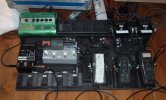 Pedals...
Pedals...
Photo: S Barnes/TWR |
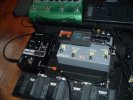 The Pete Cornish treble booster...
The Pete Cornish treble booster...
Photo: S Barnes/TWR |
It is very difficult to know whether to go for a classic guitar
or a modern equivalent. Just recently we have been using a Marshall amp
which is very old technology, isn't it? A Marshall amp and treble booster
built by Pete Cornish and that works incredibly well but the amount of hum
between takes is unbelievable. Most people would think that you can't possibly
play with that amount of hum nonetheless when the speakers are buckling
under the weight of each note that you are playing it is incredibly loud
and it is one of the reasons for playing up here rather than downstairs;
to protect everyone's hearing including my own. It is a gorgeous sound once
you have cleaned it up either by using a volume pedal in between phrases
or if Roger has managed to do what we used to call "gate out"
the thing but even that is an archaic expression. |
RK: No, I have got gates on the computer. I can use them if I want.
SH: Oh, OK.
RK: But you are right, you can edit out all the rubbish in between notes
usually!
SH: I suppose the thing is that it is a heavy amount of editing that
goes on; an incredible amount and that is why I am glad that fans don't watch
me doing that because one aims for that performance that has got that little
bit extra every time and it is a case of why does his guitar sing out and mine
fall flat? Well, the truth is I am looking for something unbelievable on just
about every note that I sustain and I just want to get down on the controls
even though I have been playing guitar for the last God knows how many…
forty years or so. It amazes me that even though I might strike it in the same
way and bend it and vibrato it but every time it will respond slightly differently
because I guess there are so many mechanical processes that are involved unlike
what goes on at THAT end. Guitars are frustratingly and yet delightfully unpredictable.
RK: Not always the case of course that the machinery does EXACTLY what
you would like it to do (laughs).
SH: I think it is because it has been driven to the limit the whole
time
RK: That is perhaps overstating it, well…they are not bug free
are they? Audio programmes and even hardware synthesisers are not hassle free.
But then… to be honest, considering what they do apart from the odd hiccup….
SB: Just out of interest, what was the song you were referring to…?
SH: well it has got a working title of "Linda" although I
might end up calling it; "A Girl Called Linda" just in case you thought
it was an aardvaark or a goldfish! (laughs). It is something from the forthcoming
album.
SB: So you are writing extra material?
SH: At one time what tended to happen with record companies was that
they would ask you to EXCLUDE certain things in certain styles and now I am
encouraged to use as wide a palette as possible because people have accepted
the idea that they will get an album that has some songs on it and some electric
guitar stuff and some orchestral stuff; some acoustic guitar and a wide variety
of things and nobody is saying; 'I don’t think that is going to fly as
a single, Steve' and so I don't have to narrow it down; it's not like that anymore.
Luckily, I think that the people who are our distributors are fans; and are
in a position of power now and understand the nature of the stuff that we are
doing.
In many ways I feel that for certain acts that have had a tremendous amount
of success, the pressure on them to keep coming up with something similar if
they are signed to a multi national must be terrible in a way. I think many
people are victims of their own success in that way and you can't really move
away too much from this confined space.
SB: I suppose it's easier having your own company doing the releases?
SH: Yeah, yeah there is that. I don't really have to audition ideas
except to Roger, of course! (laughs).
RK: Well, somebody has got to keep you in check!
SH: And Billy (Budis, Steve's manager) of course. Someone has to keep
me in check but we do write things together and I think, off the top of my head
it may be four tracks which are co-written on the next album between Roger and
myself and there is the odd cover version of other people's work; there is a
Dylan song in there and one or two others. So I am taking it from the point
of view of… on many things I am happy just to be a player rather than
the feeling that I have always got to come up with an opus every time. I just
enjoy something that I like to think is well played.
SB: Has the new album got a title yet?
SH: I can't remember off the top of my head. Yes it probably does
but it has been through a few changes and it will have to be tied in with
the artwork. I like to think there is some correlation between the two
and so I don't want to give away a title yet lest it may change and who
knows when this thing may be released and so I have got to keep quiet
about that.
SB: OK. Do you sample things for yourself? As in do your own sampling?
RK: Yes. It is not a religious process really. Occasionally when
there is a need but…
SB: There was one track on Darktown I think, which featured some
windscreen wipers …? |
 This one has been played so hard, the paint's peeled off!
This one has been played so hard, the paint's peeled off!
Photo: S Barnes/TWR |
RK: Ah, well Jerry Peal did that didn't he, not me and that was sampled
specifically for the job.
SH: Yeah, it was, that was my car at the time. I think, here we go…
I think we sampled both my car and Jerry's and we recorded both.
SB: I think the sleeve notes did say something about two different sets
or something and the abstract thing about the distance they swept or something
like that.
SH: Yeah, and one day a few years ago I had a horrendous cough and I
thought; let's not let this go to waste and so I sampled that and it appears
at the beginning of one of the new tracks on the album. I am quite pleased about
that, that it was my own cough and I didn't have to use somebody else's and
it is much more of an extensive virtuoso cough than the tiny cough that appeared
on A Tower Struck Down … I was at RADA for months! (laughs).
RK: Now would be an appropriate time to thank your coughing coach and
all the support staff (laughs) but the serious answer to the question is; the
whole process of putting things together is almost a sampling process. There
is no longer a question of hitting "record" at the beginning of a
performance and mixing that. Everything gets attention, pretty much everything
gets attention whether that means a traditional bit of EQ or compression or
whether it is manipulated in some extreme way along the lines that you would
consider to be sampling; the boundaries have gone really and so there is everything
from capturing a live performance to sampling a wasp and turning it into a melody.
Everything in between is one large grey area of audio processing. So, traditional
roles of sampling have gone really. In terms of performing string or piano samples
it is still there, obviously, but there is no longer the clear distinction between
the sampler that manipules the audio and the tape machine that you record the
results to. They are one and the same thing and you can do everything in between
whether that is reversing samples or massively changing pitch or doing all the
other processing that you can do to chunks of audio you have in the computer.
So, the answer is "yes" we do a lot of audio processing with the stuff
we have recorded for ourselves.
SH: Pretty well put, I thought
SB: Yes. So, for things like grand pianos and mellotrons you use samples
rather than the real thing or do you still try and use the real thing?
RK: In both those cases we use samples because we don't have access
to a grand piano anywhere, not currently anyway. Not that I am aware of but
in terms of mellotron at least for some of the basic library we have pristine
copies of original master tapes which sound infinitely better than any live
mellotron samples that have the crackles and distortions and the wow and flutter.
SH: Three women recorded in a bedroom in 1953, wonderful and we still
use them; we still mix them with other strange sounds whether they are samples
or whether they are real I think there is an aspect of performance that comes
out of those eight second long notes and I would like to thank those three women
personally for all the wonderful music that has come from it. It is a strange
thing of course, because when you hear a "vanilla" sound of the mellotron
each not , you think 'My God, that's not really useable, the EQ is all wrong…'
but by the time it is treated it seems to have that quality that we know and
love. It is something that Nick Magnus described as a "cold warmth"
that they have.
SB: Character...
SH: Character, that's right and instantly recognisable and mixes with
other things very well you just have to give that character some body and accent.
So we use everything, we use real players; we use samples we twin them; we triplet
them and we quadruple them and it is a fascinating process I think when something
that you might initially consider discarding finally works with the addition
of some other factor, I think it is ever more like the process of painting.
I think it is rather like what my father does with the oil paints and what Kim
does with her enamels with gradations of tint. The other allusion of course,
is that it is like a film but for the ear instead of the eye, a lot of editing;
a lot of work especially for Roger! (laughs).
SB: Do you tend to look toward "vintage" equipment for want
of a better phrase than towards newer stuff? Amps, processors; pedals; guitars
even..?
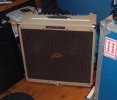 A Peavey Classic 50
A Peavey Classic 50
Photo: S Barnes/TWR |
SH: Yes, we do it is frustrating that you can't always
lay your hands on vintage material; Altec microphones for recording Blues
harmonica for instance nonetheless we put it through a number of processes
to get that maybe they could get with one mic and one amp and now we use
a speaker simulator and a wah-wah pedal, a Peavey Classic 50 which is emulating
a Fender Bassman which looks and feels a bit more reliable. I bought that
as a harmonica amp originally in Dallas and then we found that it worked
well as a guitar amp. It is the one that Eric Clapton uses to this very
day so it is funny that one amp does several things very well but we use
a speaker simulator and we record it in headphones so we can really drive
it very, very hard with a minimum amount of fuss. |
SB: You use two of those amps on stage, don't you?
SH: Yes, I do actually.
RK: It's stereo, that's why you use two.
SH: Yes, stereo that's it, everything I use is old isn't it? Everything
that a guitarist uses is by definition "old" isn't it? I use an old
Quadraverb live.
SB: (pointing at rack case) Is that your live rig
there?
SH: Some of it goes away, normally we start slinging it together
and taking it apart but the Midiverbs one or two of them go away with
us and the Quadraverb; we have a couple of those. The Quadraverb works
very well with guitars live it has a nice deep, fat sound. The Midiverbs
even though they are pre-set, the things that they do, they do very well
indeed but obviously you could replace it; you could upgrade all of this
but it just so happens that some of these things work very well. The SansAmp
works very well as a cross between a tube amp and a fuzzbox really and
the Line 6 I happen to like the green one because it does backwards effects
and most people tend to have the other one. The Pod is very useful; the
red one. I don't own one of those and I guess that most of what that one
would do, Roger seems to have in the box. I find it intriguing that when
he has actually got sound sup on that it actually has a picture of the
thing it is … |
 The live rig (mostly...)
The live rig (mostly...)
Photo: S Barnes/TWR |
RK: The amp it is simulating…
SH: Well, yeah it is great, you get a picture of the old compressor
…is it a Fairchild you have got up on there? Or is that Ben's (Fenner)
rig? These antique things.
RK: It is an attempt to convince you that it sounds like the thing it
is seeking to emulate (laughs) and by making it look like it on the screen then
psychologically it makes you think it sounds like it, I am sure.
SB: Do you think they sound like them?
RK: Many of them do a creditable job, yeah. I don't have a problem with
the tools that we have in the box anymore. It used to be the case that the compressors
weren't very good and the EQs were OK and what have you but these days they
are fantastic frankly and the answer to your vintage gear question is that computers
are full of emulations of the vintage gear that do a fair old job in most cases;
certainly for compression and EQ and so I don't think I use any vintage outboard
gear.
SH: That's recently though, isn't it? Up to about a year ago we tended
to be locked into this stuff a lot more the Joe Meek and the Urei compressor
and what have you, but it doesn't get as much of an airing these days.
SB: Do you use plug-ins inside box?
RK: Yeah.
SB: What sort?
RK: The same as everyone else really, I think there are a fair amount
of plugs which come with Logic which do all my basic things OK and bits and
pieces of Waves, the Renaissance compressor, which I am particularly fond of,
but nothing out of the ordinary really.
SB: Do you use Software Synths?
RK: Yes, particularly with samplers but again most if it is stock Logic
stuff with one or two bits and pieces which are third party but I don't think
there has been a great deal of synth work which has gone into the recent stuff
really it tends to be bits of Hammond and Mellotron and sounds that we use not
because they are old and tried and tested but because, as you mentioned earlier;
they have got character already and much of the synthetic stuff doesn't make
it on that basis.
SB: You said Hammond there would that be samples of or…?
RK: No, it would be a model its Logic's own… EVB3 which we have
been using recently. Every sound has to have character. That is now a watch
word for almost everything that comes up; is it intrinsically interesting and
worth having and if not it doesn't make it into the arrangement because otherwise
you are just fighting all the way to the end of the mix to make it worthwhile
and because we have the facility to dispense with nasty little synthesisers
and in adequate string samples from a £500 do-it-all box we are in a position
to pick and choose because if the sound doesn't cut it; if it is plain not interesting
enough then it doesn't get included. Which does tent to mean that you end up
falling back on the tried and tested - not because they are the tried and tested
but because they have survived… a violin ensemble or a violin ensemble
as captured by a mellotron or Hammond or whatever it might be. They have survived
at least in part because they have an intrinsic character and they are worthwhile
instruments in their own right.
SH: Well, exactly the mellotron brass of course is a well known characteristic
of those early Genesis albums and other bands of course. There is nothing quite
like it.
RK: Two factors apply of course. One is the intrinsic quality of the
sound and the other; in the case of the mellotron particularly and the Hammond
as well; they are unquestionably evocative of music that we have known and loved
in that type of area that Steve works in and with the audience that Steve has
and for Steve himself and me to a certain extent; the mellotron is a very evocative
sound. It is instantly recognisable as you said earlier and it is on many of
the records that we have known and loved whether it is the Moody Blues or Genesis
or Yes or Led Zeppelin even.
SH: Exactly, yeah even Garbage (the band!) or Michael Jackson or Paul
Weller.
RK: It is part of the Rock "language" isn't it? It is not
quite as central to it as a distorted guitar but it is a big part of it.
SB: But of course, you were around for the first outing for the mellotron
in that sort of sense, what do you think of people using those sounds nowadays?
Are they just doing what you were doing thirty years ago or…?
SH: Well I don't listen to every record that purports to that kind of
project if it were up to me I would prefer to hear a real orchestra doing it.
Nonetheless, if I am looking back and thinking of great mellotron moments, I
am going to be thinking of Tony doing Watcher Of The Skies despite the amount
of times the thing used to let us down live and that was because they were always
falling apart and were unpredictable and then the moment on King Crimson's Epitaph
where the note bends up and it evokes a nuclear holocaust. It is an extraordinary
sounding beast and I think because there is so much distortion inherent in it
that is the reason why it appeals to guitarists; it is closer to a guitar; it
is a cross between a violin and a guitar which is an intriguing area where you
are string driven beasts really. I am forever trying to make a guitar sound
like a violin and sometimes reverse.
I tend to… you are thinking that I was in on this from the ground up
but I believe that the forerunner of the mellotron was the Chamberlain which
was originally developed in the 1940's to …going back to the Enigma idea
of breaking codes aren't we…
SB: It was the Bradley brothers that did that…
SH: Yeah...the Flying Bradley Brothers, absolutely. That was the earliest
form of sampler as far as I am aware. I was in love with the sound for years
and years and when I first joined Genesis we didn't own a mellotron and I kept
on working away on Tony and Pete saying 'We have GOT to get a mellotron to make
these songs really work' and so that the band could have this sort of special
atmosphere where Pete could enact things and the audience wasn't going to walk
out and go off to the bar the moment we started up. It's funny you know, because
in the early days people would think of a band rising to instant success but
on those early package tours we would be on with two or three other bands and
it was by no means a success, it took three or four years before people started
to accept that the band was doing music that you couldn't necessarily tap your
foot top or sing along to and I think it was probably the mellotron that enabled
us to create this other worldly aspect; that and the odd early synth of course.
The ARP Pro Soloist monophonic and that was when we became cutting edge at that
point. It is funny when you look back of course, you know at these things now
which grace the synthesiser museum but nonetheless, it was a big step a heavy
amount of investment and the old mellotrons; the MkII used to take four men
to lift! One on each corner so once the pall bearers had had their say and their
way it was sometimes possible to turn in a good performance, if the thing deigned
to perform for you. Obviously it was a fragile thing with condensation on the
tapes and we had to wipe them clean at the beginning of performances and I dread
to think what was being used on them to try and clean them to get the distortion
off them! Spirit cleaaner which was probably eroding the tapes even further.
It is amazing and I am sure that there are still bands that do use old mellotrons
these days.
SB: There is a company in America that makes "new" ones. I
think Liam or Noel Gallagher has bought one; an actual working replica of an
original along with copies of the tapes and everything; real tape inside...
RK: He's mad!
SB: It costs about £5,000...
RK: Completely mad!
SB: I seem to remember reading somewhere that you had a set of tapes
made up for your mellotron at one point?
SH: Yeah. I got my voice put on one.
RK: A series of studio commands: "Can you just do it once more"
and "Then we will try it one more time" to save his own voice (laughs).
SH: Well, if course it took quite a bit of time in those days; tracking
it up two or three times and so we do have copies of that somewhere.
RK: It's guitar stuff; sustain notes which Streetley Electronics have
for sale now with Steve and one or two other people.
SH: So I am now part of the Mellotron and Ian MacDonald is the flute.
RK: Adrian Belew offered up some guitar as well, didn’t he?
SH: Did he really? So, you too can sound like all these people at the
push of a button.
RK: Well I have a large stock of Hackett guitar phrases which I am thinking
of packaging into an audio instrument! (laughs)
SB: Right, Steinberg do the "Virtual Guitarist" as well…
RK: Exactly, over the years I have probably got every chromatic note,
bent up; bent down; vib'd and not vib'd.
SH: He doesn't really need me anymore (laughs).
RK: Sorry about that; I need a pension you know!
SH: Of Course, I understand these things.
SB: How do you record the acoustic guitar?
SH: If it is nylon, it is with a microphone…
RK: An AKG C414 with a Urei 1176 occasionally and
usually left untouched for the solo stuff at least, if the stuff has to
fit into a rock context then it is mangled accordingly but it is usually
left pretty much alone if the sound that comes off the instrument is OK
to start with then if it doesn't have to compete with anything and doesn't
have to be modified to fit into the space it is allowed by the other instruments
then you can leave it au naturel I think.
SH: I think the interesting thing is that Roger uses a mic position
for it which is pointing down on the instrument probably about a foot
away and that eradicates too much bottom coming off the thing I think.
Sometimes when you are playing more than one part on a guitar, especially
the one that I have got; the K Yairi nylon, it has got a lot of depth
to it and that tends to cloud the upper reaches of the thing and so we
tend to wind that out. I think we use a lot of subtractive EQ stuff at
times but I do think we get a good nylon sound and we have been recording
these things for quite some time. |
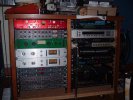 Racks...
Racks...
Photo: S Barnes/TWR |
RK: We use very little EQ actually it is only when one note on guitar;
low G which tends to boom out a bit at 100 hertz or whatever it is, but that
is a minor piece of corrective surgery really. The rest of it is left untouched.
We do more when those little solo pieces appear in the midst of a rock album
even if they are solo acoustic guitar then they have to be compressed really
in order to maintain any kind of sensible listening level for rock sensibilities;
the kind of thing you might have in the car; whatever it might be the dynamics
have to be reined in and that is a commercial necessity rather than a desire
to make it sound specific.
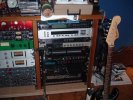
...and more racks.
Photo: S Barnes/TWR |
SB: Do you use the ambience of the room downstairs
or do you use effects?
RK: We use effects.
SB: Outboard or in the box?
RK: Its in the box these days. Lexicon has been a famous colourer
in the past for being the most natural transparent reverb that you could
get for not messing with a guitar sound too much and just giving it enough
space but these days we do it all in the box and you have samples of real
spaces which tend to work a bit better if anything. |
SH: Yes, that's an interesting one that piano thing that you have got….
RK: We did do that, didn't we?
SH: The sound box that we used on the track…
RK: Ah yes, the track that can't be named at present from the "forthcoming
Steve Hackett album" (in best commercial advertising voice). One of the
things you can do with sampling reverbs (because they are just sampling a resonant
system), is to super-impose the character of one instrument with another. I
managed to find on the Internet (and if anyone else chooses to look, they will
find it too), samples of piano sound board pedal down and pedal up. We loaded
those samples into a convolving reverb unit and ran electric sitar through it.
It is exactly the same as engineers have traditionally done recording sound
through piano sound boards except that you don’t have to get the direct
sound from the speaker that you are aiming at the piano; you get the specifically
the resonance of the piano as if it had been excited by having strings attached
to it. It is an extraordinary sound and it is one of the big processing things
that we now do which is very different from past working practices. Anyway,
electric sitar and piano sound board is a fantastic combination.
SB: Yeah, it sounds like it.
RK: I wouldn't say that the music stands or falls by the convolving
reverb unit but it does mean that we have been able to impose a character on
something that didn't have a great deal of it in the first place.
SH: We mixed it with samples and so this is really a case of the man
AND the machine, if you like together to make one sound plus this convolving
thingy that you are talking about; he said, expertly (laughs) and it is a wonderful
sound; its great. People were saying 'did you have a sitar player here to do
this?' and we could say 'No, we did it ourselves' it went through fifty three
process to get it, of course (laughs).
RK: Fifty three mental process and one computer process.
SH: It is a convoluted way of producing something that sounds really
authentic and I am really proud of that sound but then again, there are so many
things on the album that I am proud of but I can't go into that; I am not allowed
to say what's on the record.
RK: That does illustrate the entire process of putting records together
now for us at least, and for many other people too, I guess. In order to make
that very organic nature of a human performance work with the intrinsically
sterile programmed drums or whatever it may be that you are working with; violinist
against violin samples; you have to actually drag the two towards each other
in some ways so that you don't get this horrible "Stars on 45" here's
a symphony orchestra and a Linn drum nonsensical mismatch. You have to modify
the original performance in some way that fits in with the much more regimented
and sequenced material and at the same time you humanise as best you can, the
sequenced stuff and you end up with this huge grey area where you can't say
if that is a sample or that's a live performance because not only have the two
met in the middle but in some cases, they have crossed over. If you take a violinist's
or a drummer's performance and in order to rescue the performance, you cut this
thing into its tiniest constituent parts and reassemble it, you have gone almost
over to the other side of sampling individual bits and sticking them together.
The whole process, whether it be a sonic issue or a performance issue, the whole
process of putting the record together is one of melding those very disparate
parts together. The sitar which was part electric sitar and part sample stuck
through this resonance system of piano sound board in order to give it a human
"organic" feel is a good example, I think. We do that with drums,
and with strings, particularly if you just record them (great though the players
that we have used in the last couple of years unquestionably are) if you just
take what they give you in terms of their pristine human performances and lay
it up against a metronomic drum track; it doesn't really work. It doesn't work
sonically; it doesn’t work musically and you have to pull the two towards
each other somehow. That consumes the bulk of the time that we spend on the
recording process. Obviously the song writing takes time but that is part of
the mixing process also, I guess that we talked about earlier; as soon as you
have got a sound you have got to make it fit somehow and traditionally that
has been done up to a point on the very last day when you mix up in the mix
room which may not even be the same place that you were recording in six months
ago. For us now, at least that's not the case as soon as the microphone is up,
you are mixing the sound that you are recording.
SB: So everything is mixed here I take it? You haven't used anywhere
else recently?
RK: No, but even if we were to go somewhere else
the fact that it is mixed in the box means that it could be an ice cream
van in Bognor, frankly as long as the monitoring environment is OK. It's
all in the computer. It just so happens that there is a nice acoustic
environment to mix in here anyway and it is ten minutes' walk from home.
SH: Studios get smaller, don't they I think this is the crux of
it. At one time the studio floor was so important that less and less is
done the traditional way and its more and more artificial space and all
the rest. I find it wonderful, a wonderful way of working and I marvel
at it seeing the stuff take shape.
SB: Do you assemble a track with programmed drums or do you get
in a live drummer? Are you happy with programmed drums some of the time?
How much of the new album is programmed, compared to live? |
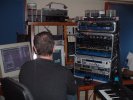 Did someone mention
Did someone mention
ice cream?
Photo: S Barnes/TWR |
SH: I think it is a mixture of the two and you have got moments that
sound deliberately programmed and moments that sound real and that's because
they ARE real and sometimes they co-exist on the same piece of music for example
there is this piece called Down Street and it is a great long thing and it is
obvious that the first half of it is programmed because we have gone for those
sounds that don't sound "real" and there is an obvious re-trigger
of an existing sound and at other times of course, when you are working with
a human being the drummer never really hits the same drum the same way twice
so it goes into an almost sort of Forties Big Band sound in the middle with
real drums and we wanted to have them all on the same piece of music. It was
the idea of London through the ages as it were and combining the sort of multi-culturalism
that is rampant now. Maybe it is a bit like cartoons and real people, it has
got a very cartoony kind of quality to it but I couldn't tell you exactly what
percentage was what. It is just a case of what does the job. Sometimes we will
twin Gary (O'Toole) playing and we will have samples playing with him as well
so you have the combination of his information overlaid with sometimes it is
compression; sometimes it's a sample.
RK: There really is no simple answer to the question which is why you
have just had a ten minute answer that doesn't really encapsulate it because
we are working in that great big grey area between what's sampled and what's
a real performance. Gary is unquestionably a fantastic drummer and there is
lots of his fantastic drumming on the record but I think there are lots of times
when you wouldn't know if it was him or a machine. As Steve says, there are
some areas which are deliberately machine like and sequenced and it is obvious
(because sonically it is nothing like a drum kit or because of the repetition
of sound it becomes obvious) that it isn't a human being. But there are areas
where the drum programming, (I think because I do it (laughs))is indistinguishable
from a live human being hitting the things and in other areas where we may have
taken a human performance and mechanised it in a way that it no longer sounds
like a drummer frankly. Or it sounds like someone attempting to programme like
a drummer would. So much of it is a grey area, there are bits and pieces where
it is plainly a top class human hitting things and as Steve said the ratio of
live drums to sequenced ones is almost impossible to say. There are several
tracks that are "human" (laughs).
SH: It's a little bit like the process of film making. A friend of mine
who made advertisements on Los Angeles for years, he was saying that the way
they work these days is that they use elements all the time so you film a bunch
of actors and then on that you are on a major motion picture you have this guy
from Nebraska and another from New York and so much as people would like to
think that everything they hear is played sequentially it just is not like that
anymore. It's much more like shooting scenes all over the place and having second
camera units and all the rest and adding things on afterwards. We couldn't not
engage with all the technology and all the choices that are there at the moment.
Right back when we were doing Genesis Revisited for instance, which was an attempt
at looking at the past and doing new versions of those things and we had a symphony
orchestra playing AND a Mellotron at the same time at the start of Watcher Of
The Skies and I think the first couple of opening chords you hear are the Mellotron
on its own and then it is joined by the orchestra. Maybe that is a good example
of us wanting to get the best out of the Mellotron in terms of the Progressive
sensibilities and it has been accepted and it is all about semantics saying
"Oh, I don't like samples I like real people doing things' but I think
the results speak for themselves and that is the crux of it. If you can't get
that snare quite bright enough after all the compression and all the distortion
and all the processes that have come to bear on it and if you need to crank
a little bit of oil can or something just to give it that crack or whatever
extra thing is, then we will go there. Obviously it is a process that requires
a tremendous amount of patience and as I say I am in the unique position of
being able to sit back and by the time I have sat down and made a cup of tea;
Roger has found something and the non-technical side of me wants to say 'It's
a miracle - look what's happened!' (laughs) Obviously I think that Roger is
the best at what he does, or more patient.
RK: Or more desperate for work! (laughs) That WAS irony by the way…
SH: Desperate to work with somebody else I have to keep him chained
(laughs). He does have an outside life and he has done lots of film scores and
TV things which he is far too modest to talk about. Roger has the added advantage
of having been through the mill of the "old school" and learned to
do everything properly in the Classical world and we are both big fans of Bach
and one or two others plus the ability to engage with all the new technology
as the true Renaissance man that he is.
SB: Actually, you mentioned about chaining him in here, I have heard
from a couple of sources that you actually do get locked in here when you are
working …
RK: Where on EARTH did that come from?! (laughing incredulously)
SH: Leave bondage out of this! (laughs)
RK: Well, we lock the front door but it is openable from the inside!
(Laughs).
SH: We do come up for air.
RK: What an extraordinary idea! Well actually, we work pretty civilised
hours I think. It tends to be about eight hours a day maximum almost. But then
again when you get past forty nobody wants to work, do they at three o'clock
in the morning like they used to.
SH: Well, now I am fifty six I can't even remember where I live anymore
(laughs).
RK: I am NOT fifty six, just for the record (laughs).
SH: No he isn't, he is much younger than I am.
RK: It doesn't tend to be an arduous process and that is the benefit
of working in your own facilities really, isn't it? That means you don't have
the pressures of working in a studio which is costing you £900 a day.
SH: No clock ticking and the expenses on those early albums, good Lord!
They were phenomenal really but I think it is the only way to get good work
done, you no longer need to cart yourself off you really can do it all in your
bedroom or ice cream van in Bognor (laughs).
RK: It also has the distinct advantage especially as we are mastering
Steve's stuff here too that you are really not bound by the time you leave the
studio on the last day either. You don’t have to have a finished product
ready by a deadline and have to suck it if it isn't quite right you can go there
again the next day or a week later or a year later if need be recall being as
easy as it is with computers. You can make modifications right down to the time
the record has to go off to the pressing plant almost. Which is a particular
benefit of working in your own facilities I think, the pressure is not on to
make your decisions; get them right especially at the mastering stage where
it is a little bit more critical than some of the other stages perhaps. It does
mean you can master in your own facilities and you don't have to listen to the
usual advice about letting somebody else have a separate set of ears .
SH: All that remix philosophy that went on a while back. Shame about
that really and luckily I am not part of that world, thank God!
RK: I have never understood this advice that people still dish out that
once you have finished your record; you need to give it to somebody else who
has a different perspective on it to finish it off. Whether that is at the mastering
stage or even early at the mixing stage. If you have been making records for
thirty four years you probably know what you want it to sound like and if you
have additionally spent months and months adjusting the finest details then
hand it over to somebody else who says 'No, it need more bass end on it' doesn't
strike me as being sensible at all.
SH: Well it is to make it sell isn't it; it's a marketing angle.
RK: Yeah, in the case of remixes but I am talking about mastering and
we are in the happy position now of being able to do the mastering, do the mixing
and if the mastering has failed for whatever reason as it sometimes does when
you do it in the same room that you have mixed it in, then you have ample opportunity
to find out and adjust it accordingly. It means particularly with this most
recent stuff it is about as transportable sonically as anything we have done.
SH: It still sounds good in the CD player in the car and it sounds OK
in the little set up in the kitchen and I have played around a bit on different
systems and obviously those things sound infinitely worse of course; the little
system I have got in the kitchen.
RK: It is the big challenge isn't it; to make something sound good on
a pair of studio monitors and also on a ghetto blaster or in the car or when
the washing machine is on or whatever it might be. The big advantage of doing
it yourself and not having the pressure of time as in the last two or three
albums we have mastered is that you can do the job over a day or two days and
then live with it; listen to it and three weeks later you can make adjustments
to it if you need to.
SH: That's right. Sometimes it does take that long for something to
sink in and sometimes something that sounds wonderful at the time by the time
you have done something else, moved on and come back to it with fresh ears and
a little bit of distance does help but its not the big deal that it once was
to do a remix or remaster by notching up something that might be a little bit
bassy for instance and to bring it in line with everything else because when
you have got so much energy going into it its like pledging alliegance to the
flag you are giving it all your patriotic energies as it were and you want to
champion it and say that it is the greatest thing since sliced bread and you
really love this; this is the world as I see it and then you detach from it
and get some distance and space and listen to a few other things and in time
you will admit that it has blemishes and you can act accordingly.
RK: It also means that when you get to that mastering stage and things
need mastering it might not just be in the mastering but in the mixing and if
things need fixing then you are not restricted to fixing them in the mastering,
you have the same kit and the same facilities to pull the mix up and adjust
it there rather than trying to make some compromise hash up in the mastering.
It is an impossible proposition for me to hand over a record that I have slaved
over for six months or a year even in some cases and say 'Right ; that’s
the best I can do, you can change it because you know better than me what my
music should sound like' which is a nonsense, isn't it?
SH: Because you have this facility now obviously when we were doing
A Midsummer Nights Dream and we went off to Abbey Road and EMI, and EMI were
paying so no problem ; the sky's the limit and all that but now of course, we
can virtually do the same job at home.
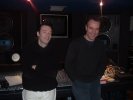 Steve and Roger discuss pensions...
Steve and Roger discuss pensions...
Photo: S Barnes/TWR |
RK: Well, not virtually we CAN, there is nothing
virtual about it. We have all the same tools and plenty of expertise!
(laughs).
SB: Does this mean that with the Virgin remasters which have come
out, does this mean you will be going over your back catalogue at some
point and remastering that or…?
SH: Well, it was Ben Fenner who remastered those and Ben did a
fabulous job on those. We did it here with his own gear but that would
be another interview entirely to speak to Ben. Yeah, there are plans afoot
to get to some more of that Charisma stuff that Virgin took over that
is something that is in the pipeline. It will happen at some point, meanwhile
we have got a new album to finish so…
SB: Are you tempted to go down the 5.1 surround sound route with
some of that material? |
SH: Yeah, the temptation is there all the time. So far my involvement
with 5.1 have been as regards DVD. Yes, I would very much like to do that whether
but whether we will prioritise it at this stage is another matter. I can't give
you a yes or no on that there are other factors which impinge on that. In the
ideal world everything would be available on all formats - everything I have
ever done! (laughs) and ever will. For now we concentrate on making this stuff
sound as enveloping and engaging as it can possibly be in stereo.
SB: Are you keeping up to date with the work that Nick Davis is doing
with the Genesis back catalogue?
SH: Yes. Unfortunately, I am not in the position to… I comment
on things and I think that masses of that stuff has had a fabulously good job
done on it and one or two things are still in the state of conjecture but I
have no idea when that stuff is likely to be released and of course the ideal
time would be if there was a band reformation but I don't think anyone is any
the wiser; the band isn't any the wiser than the fans are and so with regards
to that and so we have all made our pitch and let's just say that most of us
are hoping it is going to come off. I would love to be able to say 'Yes, I'll
be there on Thursday'. It is the question on everyone's lips including mine!
RK: My daughter isn't all that bothered! (laughs).
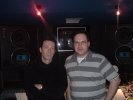 Photo: R King/TWR
Photo: R King/TWR |
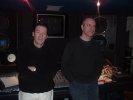 Photo: S Barnes/TWR
Photo: S Barnes/TWR |
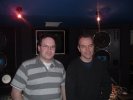 Photo: S Hackett/TWR
Photo: S Hackett/TWR |
And with that typically acerbic comment from Mr King, we shall leave
this extremely interesting AND amusing look at the background of Steve's recording
process. I hope you found it interesting. My thanks to Steve and Roger for giving
so of their time to Stuart, to Steve's manager; Billy Budis, for organising
things with his usual consummate skill; and indeed, to Stuart for conducting
the interview - you've got the job!













